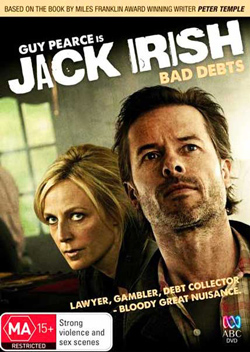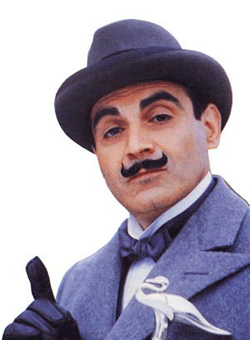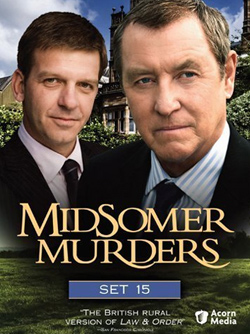
True, these tales tended to give the impression that Melbourne is a hotbed of crime and corruption in which our nation’s famously strict gun laws apparently apply to no one, which I rather hope is not the case, especially as it is my hometown. But these movie-length presentations were nevertheless completely gripping, made me fall not a little in love with their eponymous hero, and generally have me in a fever of anticipation for the next installments in the series.
There are currently two further Jack Irish novels, Dead Point and White Dog, both of which are in pre-production and are touted for 2013 premieres on Australian TV. The thing is… can I wait that long? I have since read the books on which the first two were based; both were terrific, and I really have to commend the filmmakers for their faithfulness to the source material. But this puts me in something of a bind. Because on the one hand, I am usually one who likes to read the book before I see the movie (and, in fact, often already have), but on the other hand, when it comes to crime fiction, fully half of the enjoyment of seeing it acted out on screen is the revelation of the stunning denoument, and when you know ahead of time how the climax is going to play out, it can take away from the delightful surprise of it all.

But there are times, I find, when knowing too much ahead of time can really lessen the impact of your viewing experience. Take, for example, The Walking Dead. While the TV show is by no means an entirely exact adaptation of Robert Kirkman’s cult graphic novel series, anyone who has read too far ahead in the comics knows roughly the direction in which the show is heading, which can only detract from the intense foreboding and Constant. Nailbiting. Cliffhangers. regarding what will befall our ragtag bunch of zombie apocalypse survivors next. For anyone who hadn’t read Thomas Harris’s The Silence of the Lambs, Hannibal Lecter’s cunning must have come as way more of a creepy shock; for anyone who hadn’t read The Da Vinci Code, the whole Jesus-was-married thing may have seemed pretty cool when Tom Hanks puzzled it out; for anyone who hadn’t read The Firm, how awesome when Cruise gets his murderous, mafia stooge bosses indicted for mail fraud.
Maybe it’s just that I am violently anti-spoiler in pretty much every facet of my entertainment—I hate movie trailers, avoid blurbs if I can help it, and I never “Stay tuned for scenes from our next episode” (sorry, CBS!). I especially love the surprise of a particularly clever twist, and so am ever so disappointed when that thrill of discovery is taken away from me, whether by senselessly revealing marketing, loose-lipped friends and acquaintance, or incautious Googling. But still, when we’re talking about an adaptation, shouldn’t I allow that thrill to come via the original written word, and let the later transformative work suffer in comparison? Or does it even matter at all?

Which is what I think I have decided will be the case with Jack Irish.
Peter Temple’s writing is evocative, exciting, quite exemplary really; Bad Debts had me gripped from the first paragraph (despite knowing pretty much where it was going to go), and I look forward very much to delving into the rest of his non-series bibliography, which I am certain to happily devour. But for the other, I plan to await Mr. Pearce’s convenience—though whether I will succumb to allure of written-word-Jack while enduring the long wait for onscreen-Jack, only time, and the depths of my impatience, will tell. In the meanwhile, I’m still working on Craig Johnson’s Walt Longmire novels, and the sixth Dexter book by Jeff Lindsay has long been awaiting my attention—both of which series came to me through their excellent, if somewhat liberal, television versions. Indeed, it is that very liberality of interpretation that has allowed me to read the books concurrently with watching the shows, and have neither suffer for it.
It’s funny, I used to be one to insist on accuracy in all facets of an adaptation; now, all I can say is vive la difference! Because at least that way I can read books without fearing they’ll act as spoilers for their seemingly inevitable later appearances on premium cable.
Rachel Hyland is Editor in Chief of Geek Speak Magazine.
Read all posts by Rachel Hyland for Criminal Element.

Midsummer Murders is a case where the personality of the characters in the video version are vastly different from the source material. And in he video series, now in I believe at least its twentieth series, the character of DCI Barnaby has changed considerably from the first few years before he retired last year to be replaced by his cousin, DCI Barnaby. Only Jones, his Police Sgt., carried over as they replaced even the Coroner!
Guy Pearce delivered an outstanding performance in LA Confidential. I couldn’t wait to see his next film. Then he kind of disappeared. So I’m happy to read about his TV films in Australia. Since I’m not an Aussie, I guess I’ll have to read Peter Temple’s books. Glad Pearce is appreciated for the fine actor he is.
I too enjoyed the Midsummer Murders but never read the books so I was saved from the insult of finding the character I liked misrepresented in the film.
Murder at the P&Z by Dorothy H. Hayes will be published in May.
A perfect example of a movie I found less than awesome because I’d read the book first and experienced the big twist was SHUTTER ISLAND. Martin Scorsese’s movie was very faithful to the book and quite atmospheric, terrifically shot of course, and he happens to be one of my all time favorite directors. Yet if you knew the final revelation going in, the movie lacked the suspense it was supposed to have. Still, I’m glad I read the book first because Lehane himself is such a good writer and the book really holds you from beginning to startling end.
I am a private detective and have lived in Thailand since 1977. There is little point in having such an adventure if you don’t tell anybody, so I have started to write. My previous cases were performed with the promise of confidentiality so there will be no betrayal of real persons. Instead I am writing fictional cases that are resolved in a credible environment. Some of it will seem incredible but this is Asia and we do things differently here.
The hero is Carl Engel an old Bangkok hand with three disastrous marriages to prove it. Carl the private detective has a collection of eccentric characters and a sidekick George who is unflawed in spite of having spent his youth squatting in a Vietnamese jungle. Carl leads because only he has the detached cynicism that is required to get the job done.
The job is a missing person – a wandering brother job. The brother was in the CIA’s Phoenix Program in Vietnam where he developed a taste for torture and murder. Unfortunately the killer, an elderly man, has old friends in the Thai military from his CIA days. Does playing golf with the General mean you can get away with murder?
Carl starts out as a hunter but then becomes the hunted. The book lets the reader see how a person could be found in Thailand and then shows the reader several techniques of how to avoid being found. The corrupt system that the private detective functions in ceases to be accessible to him and Carl Engel is required to find an original solution to his dilemma.
The work is 68,000 words m@expatsolutionsthailand.com